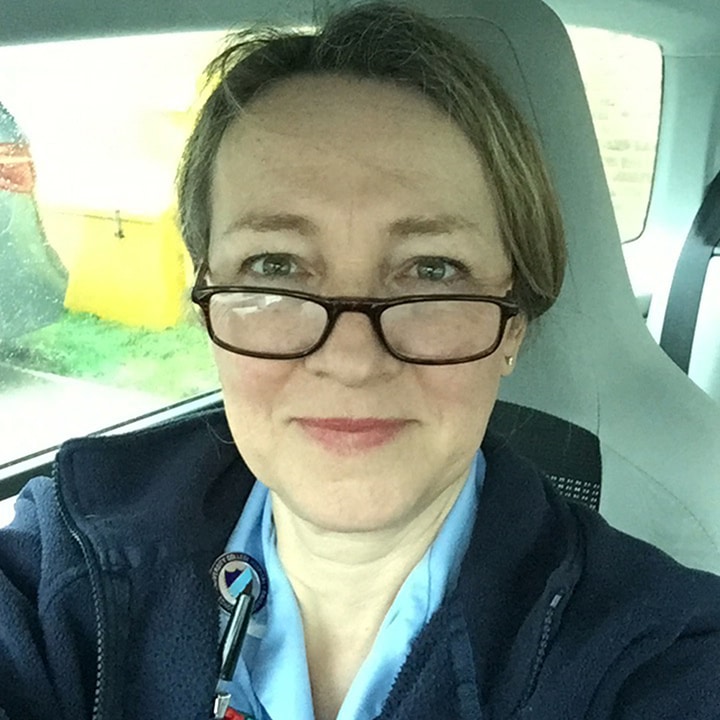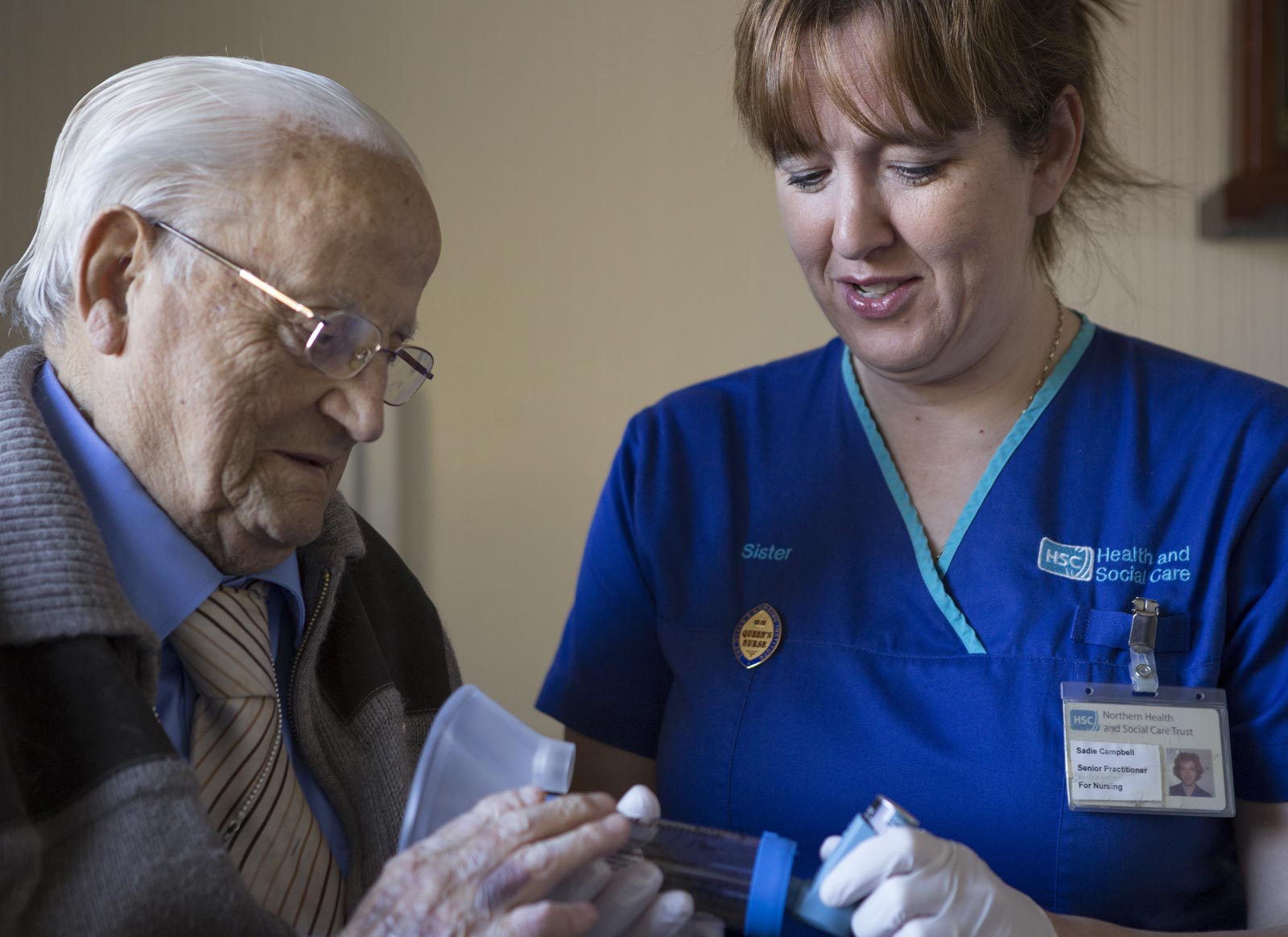The ‘Extra’ordinary work of District Nurses
28 February 2017 | Rebecca Myers

Rebecca Myers is a part time community staff nurse and executive coach/ organisational development consultant.
Trying to sit and write this blog has been a challenge – in a time of increased pressure and angst I wanted to write something that is helpful and hopeful, but which doesn’t repeat what others are already saying to an audience that already knows this stuff.
Where to begin?
Well, as the King says in Alice in Wonderland:
“Begin at the beginning and go on till you come to the end; then stop...”
I have already written about my observations of how community nursing has changed since returning to Clinical Practice after 25 years, and how the increase in acuity and complexity of people’s needs requires highly educated, ‘system savvy’ nurses to navigate the myriad of services that support people on their caseload.
But now – a year later – what I am increasingly struck by is the day-to-day ‘extra’-ordinary work of my District Nurse colleagues and those in primary and community care.
The papers report, on a daily basis, the pressures in hospital settings and excellent programmes like ‘Hospital’ on BBC 2 show a very honest depiction of how hard people are working to deliver good care. This is matched with data on the ‘crisis’ in general practice and increasing discussion about the reduction in social care funding.
Without wanting to detract from these situations, I find myself thinking of this quote by Anton Chekov:
“Any idiot can manage a crisis - it’s day-to-day living that wears you out.”
Anton ChekovClearly people working in these situations are not idiots (and one might argue, when looking at the data, that this is also day-to-day living) but the key message – that the daily ongoing management of care itself requires significant effort – is only too well known by patients, families and those working in the system.
Many of my District Nurse colleagues have been working in the community for over 20 years and describe how the demands have changed and how their roles have evolved to beyond all recognition. This has been happening quietly in the background without any fanfare.
Perhaps that reflects the qualities of the people who work in these roles – providing a supportive infrastructure for the ‘system’, just like they are to the people under their care?
This quiet evolution founded on hard work, humility and grace has enabled millions of people to be cared for at home out of the hospital setting. And yet the headlines continue to focus on what happens in the big shiny buildings where the ambulances go.
What is it about people’s fascination with a crisis and with revolutions that prevents them from seeing and valuing the day-to-day evolution and improvement?
The excitement and drama of the ‘acute’ situation, where lives are heroically saved, mirrors the celebrations around Olympic gold medals. But just like all the training that is required to win a medal, there is the day-to-day work of prevention and maintenance of people’s health and wellbeing to reduce the episodes that require hospital admissions.

This is well articulated in Atul Gawande’s recent article, “The Heroism of Incremental Care” , where he references the importance of the ongoing relationship and the holistic nature of practice. Whilst his article discusses the role of primary care physicians in the USA, he could just as easily be describing the role of the District Nurse here in the UK. He suggests that failure to recognise and invest in this work will itself become an Incremental Care crisis.
In my other role as an executive coach, people often talk about feeling in crisis mode with an “inability to manage all their demands”. We sit and map what they are doing on a matrix to enable them to see how they can prioritise and focus on what’s really important (see fig 1).
Figure 1 – Adapted from Steven Covey – Habits of Highly Effective People:
| URGENT | NOT URGENT | |
| IMPORTANT
|
|
|
| NOT IMPORTANT
|
|
|
This approach to prioritisation could be mirrored at policy level and ‘system’ level, where we might choose to invest more time and resources in the Important and Not Urgent, to prevent the number of crises. But it is not just the excitement of the crisis that grabs people’s attention, but this obsession with the shiny and new over the well-established that also can work against us.It strikes me that much of the work of the District Nurse sits firmly in the top right hand corner of the matrix.
More of the same isn’t as ‘sexy’ as something different and new. So we see ‘new’ technology and introductions of ‘new’ roles to fill perceived gaps in the service – in fact introducing change can make someone’s career. Performance is rewarded and CVs judged by the novel changes that have been made. Leadership books are even recommended on the first 100 days (Hargreave,R.) pushing CEOs and leaders to set out all that they are going to ‘change’. And yet, as someone who has spent a large proportion of her career managing and facilitating change as an organisational development practitioner, I can see the ‘new’ addition isn’t always the best answer.
With the increasing deterioration of the performance of the health and care system and the clock ticking on the delivery of the NHS England Five Year Forward view and its New Care Models, it’s easy to see how this focus on the crisis and fascination with the new runs the risk of failing to recognise the value of what is already in place.
District Nursing, in conjunction with patients, families, the wider health/care and voluntary sector, is a key part of the solution: continuing to evolve as it has, working in an integrated way to reduce duplication and ‘connecting’ the different parts of the system. Nurses focusing their time in the important/not urgent box and reducing the risk of crisis.
And yet the District Nurse community needs to look at why it is not in the headlines. The characteristics of humility and grace are admirable ones, but they run the risk of the rest of the ‘system’ not appreciating its critical role and value. Finding its voice to speak louder about the value it provides and the opportunities it affords may be uncomfortable. However, as recently articulated by Professor June Girvin , the ‘system’, and more importantly the people we serve need us to do that. As Nelson Mandela said in his inaugural speech:
“Our deepest fear is not that we are inadequate. Our deepest fear is that we are powerful beyond measure. It is our light, not our darkness that most frightens us. We ask ourselves, who am I to be brilliant, gorgeous, talented, fabulous? Actually, who are you not to be? You are a child of God. Your playing small does not serve the world. There is nothing enlightened about shrinking so that other people won’t feel insecure around you. We are meant to shine, as children do. We were born to make manifest the glory of God that is within us. It’s not just in some of us; it’s in everyone. And as we let our own light shine, we unconsciously give other people permission to do the same. As we are liberated from our own fear, our presence automatically liberates others.”
Nelson MandelaReferences
King’s Fund – GP Crisis Revealed
NHS England – Five Year Forward View
Atul Gawande – Heroism of Incremental Care
June Girvin Blog
Hargreave, R. Your first 100 days in a new Executive Job 2011

 Back to Blog
Back to Blog